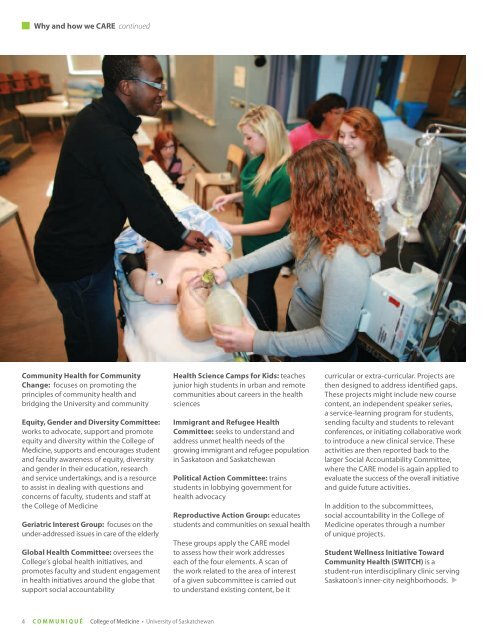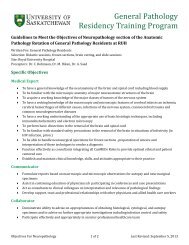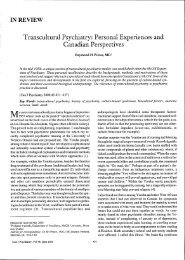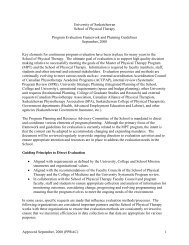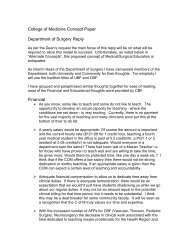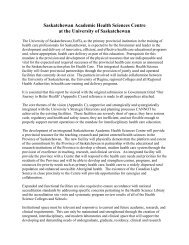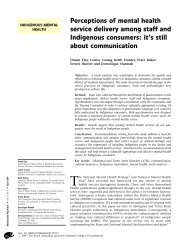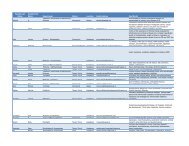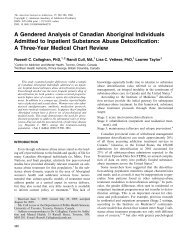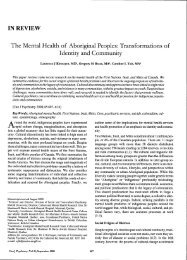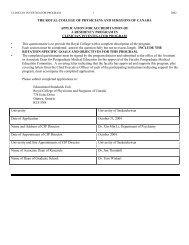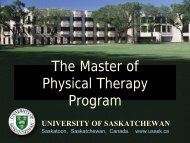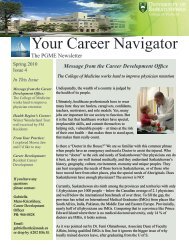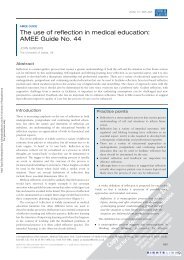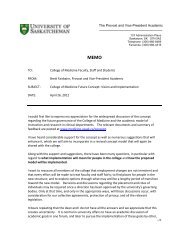COMMUNIQUé - College of Medicine - University of Saskatchewan
COMMUNIQUé - College of Medicine - University of Saskatchewan
COMMUNIQUé - College of Medicine - University of Saskatchewan
You also want an ePaper? Increase the reach of your titles
YUMPU automatically turns print PDFs into web optimized ePapers that Google loves.
Why and how we CARE continued<br />
Community Health for Community<br />
Change: focuses on promoting the<br />
principles <strong>of</strong> community health and<br />
bridging the <strong>University</strong> and community<br />
Equity, Gender and Diversity Committee:<br />
works to advocate, support and promote<br />
equity and diversity within the <strong>College</strong> <strong>of</strong><br />
<strong>Medicine</strong>, supports and encourages student<br />
and faculty awareness <strong>of</strong> equity, diversity<br />
and gender in their education, research<br />
and service undertakings, and is a resource<br />
to assist in dealing with questions and<br />
concerns <strong>of</strong> faculty, students and staff at<br />
the <strong>College</strong> <strong>of</strong> <strong>Medicine</strong><br />
Geriatric Interest Group: focuses on the<br />
under-addressed issues in care <strong>of</strong> the elderly<br />
Global Health Committee: oversees the<br />
<strong>College</strong>’s global health initiatives, and<br />
promotes faculty and student engagement<br />
in health initiatives around the globe that<br />
support social accountability<br />
Health Science Camps for Kids: teaches<br />
junior high students in urban and remote<br />
communities about careers in the health<br />
sciences<br />
Immigrant and Refugee Health<br />
Committee: seeks to understand and<br />
address unmet health needs <strong>of</strong> the<br />
growing immigrant and refugee population<br />
in Saskatoon and <strong>Saskatchewan</strong><br />
Political Action Committee: trains<br />
students in lobbying government for<br />
health advocacy<br />
Reproductive Action Group: educates<br />
students and communities on sexual health<br />
These groups apply the CARE model<br />
to assess how their work addresses<br />
each <strong>of</strong> the four elements. A scan <strong>of</strong><br />
the work related to the area <strong>of</strong> interest<br />
<strong>of</strong> a given subcommittee is carried out<br />
to understand existing content, be it<br />
curricular or extra-curricular. Projects are<br />
then designed to address identified gaps.<br />
These projects might include new course<br />
content, an independent speaker series,<br />
a service-learning program for students,<br />
sending faculty and students to relevant<br />
conferences, or initiating collaborative work<br />
to introduce a new clinical service. These<br />
activities are then reported back to the<br />
larger Social Accountability Committee,<br />
where the CARE model is again applied to<br />
evaluate the success <strong>of</strong> the overall initiative<br />
and guide future activities.<br />
In addition to the subcommittees,<br />
social accountability in the <strong>College</strong> <strong>of</strong><br />
<strong>Medicine</strong> operates through a number<br />
<strong>of</strong> unique projects.<br />
Student Wellness Initiative Toward<br />
Community Health (SWITCH) is a<br />
student-run interdisciplinary clinic serving<br />
Saskatoon’s inner-city neighborhoods.<br />
s<br />
4 C O M M U N I Q U É <strong>College</strong> <strong>of</strong> <strong>Medicine</strong> • <strong>University</strong> <strong>of</strong> <strong>Saskatchewan</strong>


